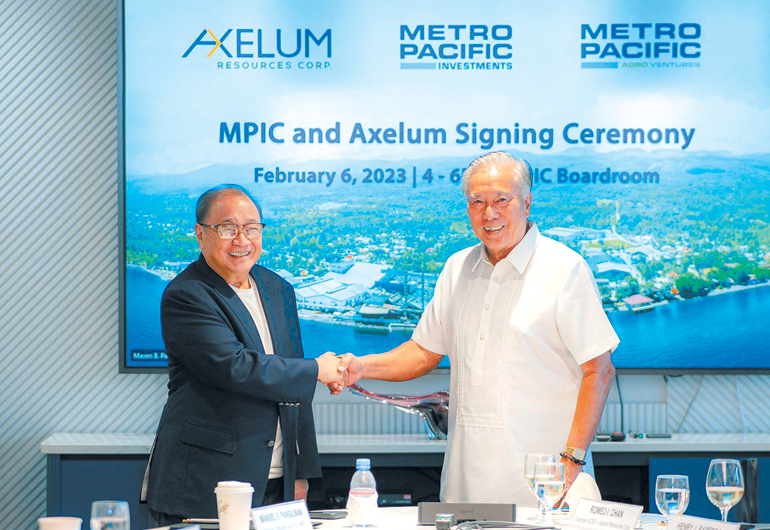Boosting the country’s agricultural space

The great disruptor we call the COVID-19 pandemic has further stressed a lot of pressing issues, among them food security and sustainability. The World Food Programme, in its recent Food Security Monitoring report for the Philippines, revealed that one out of ten households in the Philippines are food insecure. It also revealed that households that rely on agricultural livelihoods are also significantly more food insecure.
Yet, it takes a well-cultivated and nurtured agriculture sector to effectively ensure food security, where both producers and consumers benefit.
These concerns are beginning to be further addressed by both public and private sectors. And within the private sector, Manuel V. Pangilinan is among those businessmen who have echoed the important role businesses play in tackling this critical issue, particularly aiming for poverty reduction and zero hunger.
“I’m high on food production. Given this pandemic, we have to really map out where the food supplies are coming so if we are able to do that, then we can manage the logistics of bringing the food to Metro Manila in crisis events. So that people won’t get into panic-buying mode as what we’ve experienced in the early weeks of this pandemic,” Mr. Pangilinan said.
Mr. Pangilinan has begun walking such talk when Metro Pacific Investment Corp. (MPIC) started including the agriculture sector in its portfolio with its entry into a strategic partnership with the Carmen’s Best Group.
“Agriculture should certainly get more attention and investments for a number of reasons because it’s out there in the hinterlands where most of our underserved people are located, and because we are focusing on providing jobs,” Mr. Pangilinan said during the National PR Congress held last year.
Furthermore, the MVP Group’s contributions in boosting agribusiness and agriculture can be seen in its investments in Roxas Holdings, Inc. (RHI) and Metro Pacific Agro Ventures (MPAV).
MPAV, a subsidiary of MPIC, aims to focus on improving the agribusiness sector, particularly on addressing the basic needs of Filipinos through food supply.
According to Mr. Pangilinan, the MVP Group is focusing more on the agribusiness sector, especially when they realized that the country’s imported food percentage is higher than its exports, resulting in the need of increasing local food production in order to enable food sufficiency in the Philippines.
MPAV intends to further improve and develop the dairy business in the Philippines, as it saw high demand consumption for dairy recently.
In a stockholders’ meeting earlier this year, MPAV President and Chief Executive Officer Jovy Hernandez said the company is working on several solutions to boost the dairy business. This includes working with other dairy and local farmers and pushing for new dairy facilities that will help increase dairy production. MPAV is also focusing its attention on the ice cream market, which is increasing by more than 50% annually.
In addition to the dairy business, Mr. Hernandez also emphasized MPAV’s plan in looking at the coconut sector. Previously, the Philippines ranks number one in the world in coconut production, but recently there has been a decline in coconut production in the country. In response, MPAV intends to focus on boosting the higher-value products in this sector, including coco water, coconut oil, and desiccated coconuts.
Earlier in February, MPAV acquired 34.76% ownership in Axelum Resources Corp., a leading manufacturer and exporter globally of high-quality coconut products and one of the major suppliers of Vita Coco coconut water.
While primarily a sugar and ethanol producer, RHI is also considered “a first mover in the area of agribusiness.” One of its subsidiaries, RHI Agri-Business Development Corp., operates the company’s sugarcane plantations and provides farm mechanization services to sugarcane planters and farmers to help improve productivity and promote modernization.
More recently, RHI sees a positive light for its sugar refinery business this year, recognizing that the sugar industry is one of the main agricultural sectors vulnerable to climate change.
According to RHI Chairman Pedro E. Roxas, the agribusiness’ shift to sugar refinery is “just in time” since cane supplies have been negatively impacted by climate change.
The company also expressed its confidence that the recently completed stand-alone refinery project of another subsidiary Central Azucarera Don Pedro, which operates a sugar mill and refinery in Batangas, will further enable the refinery plant to operate for a long period and so provide stakeholders with a “viable and more sustainable business, considering the continued strong demand for refined sugar.” — A.K.S. Brillantes



